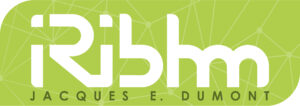PhD students
IRIBHM International PhD programme 2025.
To apply: https://iribhmphd.ulb.be
IRIBHM is a research institute of the Faculty of Medicine of the Université Libre de Bruxelles (ULB). The institute offers an internationally renowned research environment in molecular biology and life sciences, dealing with various topics that span receptor pharmacology and the discovery of new therapeutic targets to early embryonic development, stem cells, organoids and cancer. The Institute has trained a number of talented young scientists at both graduate and postdoctoral levels over the years.
To expand internationally and further enhance its level of excellence, IRIBHM (https://iribhm.org/) is launching its international PhD programme to prepare future leaders in biomedical sciences. Several PhD fellowships are available. The successful candidates will have the opportunity to work in a warm and stimulating research environment, guided by the highest international standards.
As the hub of the European Union, Brussels is an ideal location for an international PhD programme. In addition, the city shows an active cultural life and is hosting most nationalities from around the world.
We look forward to welcoming you in Brussels!
Requirements:
- Diplomas and degrees equivalent to a European Union Master’s degree, which includes project work summarized in a written “small thesis”
- Two referees willing to provide letter of recommendations
- Excellent knowledge of English
- Excellent interpersonal and organisational skills
Closing date for CV and letters submission: May 4, 2025.
Accepted candidates may start research projects as early as November 2025
Visit our website http://iribhmphd.ulb.be for more details and CV submission.
Postdoc 1
Sabine Costagliola Lab: Postdoc position in organoids research for modeling rare diseases
The Costagliola lab, at IRIBHM, ULB, Brussels, (https://costalab.ulb.ac.be/ ; https://iribhm.org/) is seeking a creative, motivated and highly independent postdoctoral fellow with a good expertise in Human stem cell-derived organoids. The project aims to uncover the molecular pathways responsible for resistance to Thyrotropin, a rare human disorder initiated by a newly identified genetic variation unique to primates.
This position is fully funded for 3 years. Salary commensurate with experience.
Project Background
Embark on a Transformative Journey to Decode Congenital Hypothyroidism
The Costagliola lab, at IRIBHM, ULB, Brussels, (https://iribhm.org/) is seeking a creative and highly motivated PhD student. This project aims to use organoid technology for thyroid disease modeling using patient derived IPSc.
Embark on a Transformative Journey to Decode Congenital Hypothyroidism!
Are you ready to tackle one of the most intriguing puzzles in rare endocrine diseases? Congenital hypothyroidism (CH), a rare endocrine disorder (affecting 1 in 3,000 newborns), remains largely enigmatic. Despite the identification of a few genetic culprits—like PAX8, TSHR, FOXE1, and NKX2.1—the underlying molecular mechanisms of CH remain a mystery in 95% of cases.
Now is the perfect time to step into this challenging and rewarding field. With groundbreaking advances in next-generation sequencing and revolutionary breakthroughs in stem cell science, we are uniquely positioned to rewrite the story of CH. From creating functional thyroid tissue using human embryonic stem cells (hESCs) to reprogramming somatic cells into induced pluripotent stem cells (iPSCs), these cutting-edge tools provide unparalleled opportunities to uncover the secrets of thyroid development and its disruption in CH.
Our laboratory is at the forefront of this revolution, excelling in the creation of thyroid organoids derived from human pluripotent stem cells. As a PhD student, you will harness this organoid technology to:
1️-Develop innovative iPSC models for CH.
2️ -Employ cutting-edge single-cell multiomics (scRNAseq, scATACseq) to map the molecular and genomic choreography of normal and pathogenic thyroid development.
Your research will not only shed light on the elusive mechanisms behind CH but also pave the way for patient-specific models, improved diagnostics, and innovative treatments for CH and other thyroid disorders.
Join us in shaping the future of thyroid research—where your discoveries will have the potential to transform lives. Take the leap and become a pioneer in this thrilling field! Your PhD journey awaits. 🚀
Benefits
As a PhD student in our dynamic team, you will have access to expert mentorship, state-of-the-art imaging and cell biology facilities, and the opportunity to collaborate closely with leading specialists in organoid technology. Immerse yourself in an exciting multidisciplinary project that integrates organoids, gene editing, advanced imaging, and cutting-edge transcriptomics. Together, we will tackle pivotal questions in thyroid research and developmental biology, driving innovation and discovery in these critical fields.
Key tasks and responsibilities:
Implement new models of organoids.
Cellular and molecular characterization of those organoids
Conduct single-cell RNA sequencing, single-seq ATAC sequencing and transcriptomic and genomic analysis.
Qualifications:
Master in Biology, medical biology, Bioengineering or a related field.
This project is ideal for an ambitious and enthusiastic candidate who thrives in a dynamic environment. Proficiency in scientific English—speaking, reading, and writing—is essential.
To complete your application (see documents on our website), kindly provide a cover letter detailing your research interests and career aspirations, along with an updated CV and the contact details of two or three references.
Contact: Sabine Costagliola sabine.costagliola@ulb.be
Postdoc 2
The lab of Somatic & Cancer Genome Evolution has an open wetlab postdoc position to study somatic evolution and cancer 🧬🔬
Details and application are here: https://euraxess.ec.europa.eu/jobs/315679
#Postdoc #CancerResearch #MolecularBiology #Genomics






